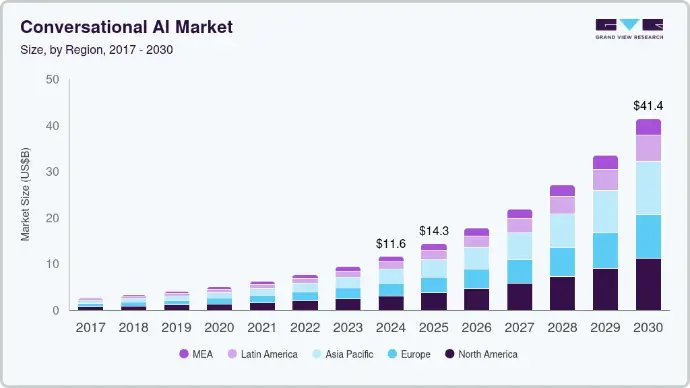Customer service has always been about one thing: solving problems quickly and effectively. But in today’s digital-first world, customers expect fast, personalised, and seamless interactions across every channel. Enter conversational AI customer service – a powerful technology transforming how businesses support and retain their customers.
What Is Conversational AI in Customer Service?
Conversational AI refers to technologies – like AI chatbots and virtual assistants – that use natural language processing (NLP), machine learning, and automation to simulate human-like conversations. Unlike traditional rule-based bots, conversational AI can understand context, learn from interactions, and deliver more accurate, dynamic responses.
This makes conversational AI one of the most effective tools for improving AI customer experience and driving loyalty.
Why Businesses Need AI Customer Support
- 24/7 Availability
Customers no longer want to wait until “business hours”. AI chatbots provide always-on customer support, making help available at any time, in any time zone. -
Scalability
Human agents have limits, but conversational AI can manage thousands of conversations simultaneously. This makes AI-powered customer service ideal for growing businesses. -
Cost Efficiency
By automating routine inquiries – from password resets to order tracking – AI chatbots for business lower costs while freeing agents to focus on complex cases. -
Personalisation
With CRM integration, AI-powered support can deliver personalised responses – whether it’s suggesting a product, resolving an account query, or offering a tailored solution. -
Consistency
Unlike humans, AI never has an “off day”. This ensures customers receive consistent service across every channel.
Human + AI: The Future of Customer Experience
Conversational AI isn’t here to replace humans – it’s here to enhance customer service teams.
- AI handles routine, high-volume requests.
- Human agents manage empathy-driven or complex conversations.
This hybrid approach combines AI’s speed with human empathy, building both trust and loyalty (Deloitte, 2023: https://www2.deloitte.com/global/en/pages/technology/articles/ai-in-customer-service.html).
Examples of Conversational AI in Action
H&M (Retail): The fashion brand’s AI chatbot for customer service helps shoppers browse outfits, check stock, and even get styling advice – creating a smoother shopping experience.


Bank of America’s “Erica” (Banking): With over 32 million users, Erica provides AI customer support by helping clients track spending, pay bills, and receive proactive financial insights – proving that conversational AI can handle sensitive, high-trust interactions.
Babylon Health (Healthcare): Babylon uses conversational AI to triage symptoms, book appointments, and provide instant health advice. Through its partnership with the UK’s National Health Service, this virtual assistant improves patient access while reducing pressure on healthcare providers.

These real-world case studies show that conversational AI goes far beyond answering FAQs – it’s becoming a strategic tool for customer engagement.
The Rise of Conversational AI in Business: A Decade of Transformation
Over the past decade, conversational AI has evolved from a novel concept to a critical component of business strategy. The integration of AI-powered chatbots and virtual assistants has significantly transformed customer service operations, leading to measurable improvements in efficiency, customer satisfaction, and business growth.
Market Growth and Adoption Rates
-
Global Market Expansion: The conversational AI market has experienced substantial growth, with projections indicating an increase from USD 11.58 billion in 2024 to USD 41.39 billion by 2030, reflecting a compound annual growth rate (CAGR) of 23.7%.

(Grand View Research, 2025: https://www.grandviewresearch.com/industry-analysis/conversational-ai-market-report) -
SME Adoption: A survey conducted in 2025 revealed that 41% of small businesses have adopted AI technologies, marking a 41% increase from previous years. This surge highlights the growing accessibility and perceived value of AI solutions among SMEs (Thryv, 2025: https://investor.thryv.com/news/news-details/2025/AI-Adoption-Among-Small-Businesses-Surges-41-in-2025-According-to-New-Survey-from-Thryv/default.aspx).
-
Industry Utilization: Approximately 78% of firms have integrated virtual assistants or conversational AI into at least one business function, particularly in customer support, sales, and marketing (OpenXcell, 2025: https://www.openxcell.com/blog/conversational-ai-companies/).
Impact on Customer Service
-
Customer Interaction Preferences: Studies indicate that 49% of U.S. adults have interacted with an AI-powered chatbot for customer service in the past year, demonstrating a significant shift towards AI-driven customer interactions (Pew Research, 2025: https://www.pewresearch.org/internet/2025/04/03/artificial-intelligence-in-daily-life-views-and-experiences/).
- Customer Satisfaction: Over 59% of customers rated their experiences with AI customer support at least eight out of ten, with a notable 17% awarding a perfect score of ten, underscoring the effectiveness of AI in enhancing customer service quality (Business Dasher, 2025: https://www.businessdasher.com/ai-customer-service-statistics/).
Looking Ahead: The Next Era of AI Customer Experience
As conversational AI advances with large language models and multimodal capabilities – voice, text, and even image-based support – the gap between AI chatbots and human agents will continue to close. Businesses adopting these technologies today will be the ones setting the standard for AI-powered customer experience tomorrow (MIT Sloan, 2023: https://sloanreview.mit.edu/article/how-ai-is-changing-customer-experience/).
At Clevacat, we believe SMEs deserve access to the same AI-powered tools as large enterprises. Whether it’s predictive modeling, conversational AI, or end-to-end business automation, we help organisations turn their data into real competitive advantage.